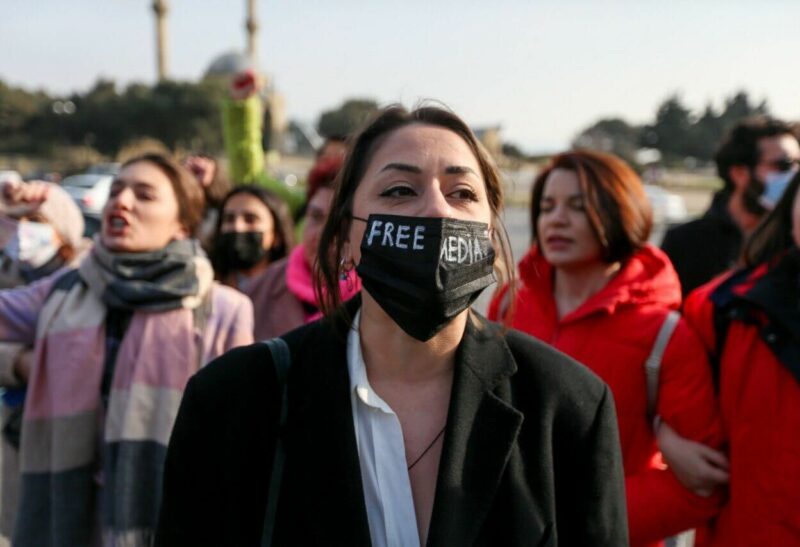Nigar Hezi (Yaqublu) is the daughter of Tofiq Yaqublu, the deputy chairperson of the Azerbaijani opposition party Müsavat, as well as the spouse of Seymur Hezi, a journalist under arrest.
In September, 2012, Nigar Hezi got into a traffic accident; she was the one driving. A relative, who was sitting alongside her in the car, died. Nigar has been experiencing serious psychological problems since her release: “The adaptation period has been difficult”.
The Law
2015 was the last time that the State Statistical Committee of Azerbaijan unveiled the number of women who had committed crimes. According to this statistic, 1,128 women committed crimes in 2015.
In many countries there are agencies that facilitate the societal adaptation of people released from prison. And in Azerbaijan there is the law “On the social adaptation of individuals released from correctional institutions”. In accordance with this law, adopted in 2007, rehabilitation centers should be built, work should be done with former inmates. However, the requirements stemming from this law have still not been fulfilled.Mehriban Zeynalova, chairperson of the Pure World Women’s Aid Association, says that the adaptation process for imprisoned women should begin six months previous to the end of their sentence. And the Ministry of Justice should be interested in cooperating with the NGO in this sphere:
“After time in prison, women can be sent to shelters. There they can spend some time recovering, and then return home to their family. Because of the judgement of those around them, because society pushes away freed women, these people’s risk of relapse is increased. They can commit a repeat crime and once more end up in prison. In order to prevent such situations, these women should go through a program of adaptation to normal life.”
Psychologist Rafiq Abdullayev says that among convicts there is a low percentage of women. The age of female convicts is primarily 30-50 years old. The average age of sentenced women is higher than that of men.
“I always feel judged by the people around me”
Guljahan Aliyeva, who spent three years in prison, also says that she can’t adapt to society: “Even though I served the sentence for my crime, I couldn’t find work again in my profession. In prison, I learned to sew a little. And now I work as a dressmaker in one shopping center. I make decent money. But I constantly feel judged by the people around me. Maybe this isn’t the case, but this feeling won’t leave me. It’s so hard to get used to this life after prison! It’s especially hard for women. The majority of them aren’t accepted by their families. In general, there is little trust towards people who’ve been released from prison, it’s harder for them to find work. It becomes impossible to return to one’s previous life, and you can’t start a new one…”
The story of Samira Mehraliyeva, who was in prison for eight years, is very similar to the previous one. Mehraliyeva is from the north-western region of the country. According to her, she has already been free for six years. But during that time she has, on more than one occasion, wanted to return to prison, because the past prevents her from creating a normal life outside of prison:
“It’s easy for men! If they can’t find work, they go to Russia! But for women, it’s not the case. If people find out that you did time, nothing will help you to recover in their eyes. You will always have this stigma on you.”
Mehraliyeva works as a janitor for a company:
“And this work was found for me by the relatives of one of my comrades from prison. Over the course of three years working here I’ve been trying to build a new life. And previous to finding this work, I so often thought about how I might commit another crime! In prison you can at least find a scrap of bread, but I lucked out, there still are good people”.
“The problem is not limited to society”
As regards families’ attitudes towards woman inmates, Nigar Hezi says that many of the women in prison have never had a visitor. She recalls the period of adapting to society like this:
“After the wave of guests wanting to congratulate me on my release subsided, I was alone. It was hard for me to go outside. You have relatives and neighbors, but they haven’t seen you for a long time. They look at you with interest. People think, ‘Where is the woman, and where is the prison’. ‘If a woman has gone to jail, she’s already finished’ – and the majority think this way. I think that these stereotypes disappeared when the human rights activist Leyla Yunus and the journalist Hadija Ismailova were arrested. Previous to this, everything was new and unusual for the majority of society. Now I understand that women, like men, can be imprisoned, and can undergo punishment. For a while they called me ‘the girl who spent time in prison’. It’s hard to live with this”.
Nigar Hezi says that the problem is not limited to society, but that the system must also be changed:
“You cannot simply say to inmates, ‘your term is up, leave’. They should be prepared months ahead for life after prison. Even after arrest, there should be certain programs. And do they have somewhere to go, somewhere to stay? Nobody is interested”.
Mehriban Zeynalova believes that NGOs dealing with women’s issues can help them:
“We can help them find work, can give psychological support. Because it is precisely the women who commit crimes that can commit them again. For example, inmates believe that after serving their sentence they will be treated fairly in society. But they very quickly understand that their expectations have not been met. In this case, their psyche suffers. So that this won’t happen, they should be prepared for life beyond the prison bars”.



